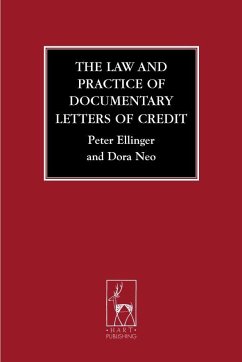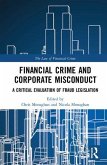- Gebundenes Buch
- Merkliste
- Auf die Merkliste
- Bewerten Bewerten
- Teilen
- Produkt teilen
- Produkterinnerung
- Produkterinnerung
Letters of credit have retained their role as an instrumentality for the financing of foreign trade. An understanding of the law and practice in point is imperative for lawyers advising business people and bank clients, as well as for the banking and trading communities. The book examines the topic on the basis of the common law system, primarily UK law, and adopts an approach that is analytical and not merely descriptive. Letter of credit transactions are, by their nature, international and most nations have adopted the Uniform Customs and Practices ("UCP") originally promulgated by the…mehr
Andere Kunden interessierten sich auch für
![Consumer Credit Law and Practice - A Guide Consumer Credit Law and Practice - A Guide]() Dennis RosenthalConsumer Credit Law and Practice - A Guide127,99 €
Dennis RosenthalConsumer Credit Law and Practice - A Guide127,99 €![Letters of Credit C Letters of Credit C]() Ebenezer AdodoLetters of Credit C437,99 €
Ebenezer AdodoLetters of Credit C437,99 €![The Law of Consumer Credit and Hire The Law of Consumer Credit and Hire]() Stephen NevilleThe Law of Consumer Credit and Hire554,99 €
Stephen NevilleThe Law of Consumer Credit and Hire554,99 €![Financial Crime and Corporate Misconduct Financial Crime and Corporate Misconduct]() Financial Crime and Corporate Misconduct197,99 €
Financial Crime and Corporate Misconduct197,99 €![Market Power in EU Antitrust Law Market Power in EU Antitrust Law]() Luis Ortiz BlancoMarket Power in EU Antitrust Law239,99 €
Luis Ortiz BlancoMarket Power in EU Antitrust Law239,99 €![The Tax Schedule The Tax Schedule]() Eile GibsonThe Tax Schedule142,99 €
Eile GibsonThe Tax Schedule142,99 €![The law and Practice Relating to Letters Patent for Inventions The law and Practice Relating to Letters Patent for Inventions]() William Fischer AgnewThe law and Practice Relating to Letters Patent for Inventions43,99 €
William Fischer AgnewThe law and Practice Relating to Letters Patent for Inventions43,99 €-
-
-
Letters of credit have retained their role as an instrumentality for the financing of foreign trade. An understanding of the law and practice in point is imperative for lawyers advising business people and bank clients, as well as for the banking and trading communities. The book examines the topic on the basis of the common law system, primarily UK law, and adopts an approach that is analytical and not merely descriptive. Letter of credit transactions are, by their nature, international and most nations have adopted the Uniform Customs and Practices ("UCP") originally promulgated by the International Chamber of Commerce (ICC) in 1933 and updated from time to time. Today, the UCP constitutes a code of internationally accepted rules governing letter of credit transactions. The authors have therefore selectively incorporated some comparative discussion, for instance, of the position in the USA and Europe. The book will be an essential work of reference for commercial lawyers in all the major financial centres of Europe, America and Asia.
Hinweis: Dieser Artikel kann nur an eine deutsche Lieferadresse ausgeliefert werden.
Hinweis: Dieser Artikel kann nur an eine deutsche Lieferadresse ausgeliefert werden.
Produktdetails
- Produktdetails
- Verlag: Bloomsbury Academic
- Seitenzahl: 474
- Erscheinungstermin: 1. Januar 2010
- Englisch
- Abmessung: 250mm x 181mm x 33mm
- Gewicht: 992g
- ISBN-13: 9781841136738
- ISBN-10: 1841136735
- Artikelnr.: 24984622
- Herstellerkennzeichnung
- Libri GmbH
- Europaallee 1
- 36244 Bad Hersfeld
- gpsr@libri.de
- Verlag: Bloomsbury Academic
- Seitenzahl: 474
- Erscheinungstermin: 1. Januar 2010
- Englisch
- Abmessung: 250mm x 181mm x 33mm
- Gewicht: 992g
- ISBN-13: 9781841136738
- ISBN-10: 1841136735
- Artikelnr.: 24984622
- Herstellerkennzeichnung
- Libri GmbH
- Europaallee 1
- 36244 Bad Hersfeld
- gpsr@libri.de
Dora Neo is an Associate Professor and the founding Director of the Centre for Banking & Finance Law at the Faculty of Law, National University of Singapore.
1. Documentary Credits in Practice I. Background II. Documentary Credits
Distinguished from Similar Facilities A. Documentary Credits and Open
Credits B. Letters of Credit with a 'Red Clause' C. Standby Credits and
Performance Bonds III. Documentary Credits Classified A. Need for
Classification B. Revocable and Irrevocable Credits C. Confirmed and
Unconfirmed Credits D. Straight and Negotiation Credits E. Transferable and
Non-Transferable Credits F. Revolving (Evergreen) Credits IV. Use of Bills
of Exchange V. Review of a Transaction 2. The Uniform Customs and Other
Sources of Law I. Applicable Sources II. The Uniform Customs and Practice
for Documentary Credits (UCP): Their Development A. Their Background and
History up to 1993 B. UCP 500 and Related Guidelines C. UCP 600 III. Legal
Nature of the UCP A. The Legal Effect of the UCP B. Construction of the UCP
C. Application of the UCP in Borderline Cases IV. Usages and Banking
Practice A. Basic Principles B. Effect of Trade Usages on Documentary
Credit Transactions C. Role of Banking Practice V. Statutes and Laws A.
Scope B. Article 5 of the Uniform Commercial Code (USA) C. Statutory
Provisions in Other Jurisdictions 3. The Documentary Credit Clause of the
Underlying Contract I. Nature of Clause II. Time at which Credit must be
Furnished III. Type of Credit to be Furnished IV. Waiver of Documentary
Credit Clause V. Effect of Opening of Credit and its Dishonour 4. Contract
between Applicant and Issuing Bank I. General Aspects of Legal Relationship
A. Opening the Credit B. Vicarious Performance-Use of Correspondent Banks
C. Nature of Relationship II. Issuing Bank's Obligations A. Issue and
Honour Credit B. The Issuing Bank's Mandate C. Autonomy of Credits D.
Non-Conforming Presentation: Duty Not to Honour E. Issuing Bank's Duty of
Care III. Disclaimers and Exclusions of Liability A. The UCP Provisions B.
Effectiveness of Disclaimer Regarding Acts of an Instructed Party C. Deemed
Compliance Clause IV. Applicant's Obligations A. Reimbursement for Amounts
Payable under the Credit B. Commission and Other Charges C. Arrangements
for Payment by the Applicant V. Documents as the Issuing Bank's Security A.
Pledge of Bills of Lading B. Trust Receipts 5. Issuing Bank's and
Confirming Bank's Contract with Beneficiary I. Nature and Content of
Agreement between Issuing Bank and Beneficiary A. Form and Content B. When
Does a Binding Contract Arise? C. Consideration D. Contracts (Rights of
Third Parties) Act E. Amendment F. Enforceability of Contract II.
Obligations of Issuing Bank and Confirming Bank A. General Introduction B.
UCP 600 Article 7: Issuing Bank's Undertaking C. UCP 600 Article 8:
Confirming Bank's Undertaking D. Autonomy and the Fraud Exception III.
Complying Presentation by Beneficiary A. Presentment of Stipulated
Documents: Documentary Compliance B. Bank's Duty to Examine, Honour or
Reject C. Bank Precluded from Claiming Non-Complying Presentation D. Time
and Place of Presentation IV. Bank's Liability towards Beneficiary A.
Wrongful Dishonour B. Late Payment C. Defences for Non-Payment D. Set-off
E. Competition between Issuing Bank and Assignee of Proceeds of Credit V.
Bank's Right of Recourse against Beneficiary A. Complying Presentation B.
Non-Complying Presentation C. Bills of Exchange D. Fraud and
Misrepresentation 6. Autonomy and the Fraud Exception I. Autonomy Principle
II. Statement and Scope of the Fraud Exception A. Decision in United City
Merchants B. Scope of the Fraud Exception III. Effect of Fraud A. Bank's
Refusal to Honour B. Is a Bank Entitled to Reimbursement? C. Will Court
Grant Injunction to Stop Payment? D. Bank's Recourse Against Beneficiary
IV. Extension of the Fraud Exception: Other Exceptions to the Autonomy
Principle? A. General B. Nullity Exception 7. The Correspondent Bank I.
General Introduction A. Roles of Correspondent Bank B. Overview of
Correspondent Bank's Legal Position C. Correspondent Issuer II. The
Advising Bank A. Role of Advising Bank B. Provisions of the UCP III. The
Nominated Bank A. Who is a Nominated Bank? B. No Duty to Honour or
Negotiate C. Rights and Liabilities of Nominated Bank D. Prepayment of
Deferred Payment Credit or Acceptance Credit E. Negotiating Bank F.
Correspondent Bank and Beneficiary: Payment under Reserve IV. The
Confirming Bank A. General B. Confirming Bank's Rights and Obligations C.
Silent Confirmations V. Recourse by and Against the Correspondent Bank A.
Issuing Bank's Recourse Against Correspondent Bank B. Correspondent Bank's
Recourse Against Beneficiary VI. Applicant's Extra-contractual Options
Against Correspondent Bank A. No Privity of Contract B. Contracts (Rights
of Third Parties) Act (CRTPA) C. An Action in Tort 8. The Reimbursing Bank
I. Practice II. Relationship of Reimbursing Bank and Issuing Bank III.
Relationship of Reimbursing Bank and Claiming Bank IV. The Reimbursement
Claim V. Exemption Clauses 9. The Beneficiary's Bank I. Current Practice
II. Relationship of the Beneficiary with his Bank A. Collection and
Negotiation Distinguished B. Silent Confirmations C. Bank's Right of
Recourse against the Beneficiary III. The Rights of the Beneficiary's Bank
Against the Issuing Bank IV. Clashes, Priorities and Set-off A. Meaning of
Terms B. Clashes C. Priorities D. Set-off E. Position where the
Beneficiary's Bank is a Nominated Bank 10. Tender of Documents: General
Principles of Documentary Compliance I. Introduction II. Examination of
Documents A. The Bank's Duty of Examine Documents B. The Principle of
Strict Compliance C. Consistency of Documents; Data in Documents not to be
in Conflict D. Original Documents; Copies of Documents; Signatures E.
Alterations and Corrections to Documents F. Language G. Limits of Drawing
on Credit, Quantities,Unit Price and Partial Shipments H. Dates Stipulated
in the Credit and Dates on Documents I. Non-Documentary Conditions III.
Time for Examination and Rejection of Discrepant Documents; Rejection
Notice; Waiver A. The Time Allowed for Examination and Rejection of
Documents B. Rejection Notice: Contents and Means of Communication C.
Preclusionary Effect of Not Acting in Accordance with Article 16 11.
Compliance with Specific Documents I. Introduction II. The Commercial
Invoice A. UCP 500 B. UCP 600 III. Transport Documents A. Marine or Ocean
Bills of Lading (UCP 500) B. Bills of Lading (UCP 600) C. Non-Negotiable
Sea Waybills D. Charterparty Bill of Lading E. Multimodal Transport
Documents F. Air Transport Documents G. Road, Rail or Inland Waterway
Transport Documents H. Courier and Post Receipts I. Transport Documents
Issued by Freight Forwarders IV. Certain Issues Common to Transport
Documents A. Deck Carriage B. Freight C. Consignor of Goods/Beneficiary of
Credit D. 'Clean' Transport Documents E. Terms and Conditions of Carriage
F. Vessels Propelled by Sail Only G. Partial Drawings or Shipments H.
'Stale' Transport Documents I. Attestation or Certification of Weight V.
Insurance Documents (UCP 500) A. Type of Insurance Cover B. All Risks
Insurance Cover C. Form of Insurance Documents and Originals D.
Commencement of Cover E. Amount of Insurance Cover F. Excess (Deductible)
VI. Insurance Documents (UCP 600) A. Introduction B. Signature by Proxies
C. Originals D. Cover Notes E. Pre-signing F. Amount of Coverage VII.
Unspecified Documents (UCP 500) A. Issuers and Data Content B. Ambiguous
Instructions C. Consistency D. Dates E. Drafts VIII. Unspecified Documents
(UCP 600) A. 'Not Conflict With' 12. Transfer and Assignment of the
Proceeds of a Letter of Credit I. Transfer, Back-to-back Credit, Transfer
of Drawing Rights and Assignment of Proceeds Distinguished II. Transfer of
Letter of Credit A. The Practice and the Duty of Confidentiality B. Legal
Nature of Transfer C. The Regime of Article 38 of UCP 600 III. Back-to-Back
Credits A. The Practical Distinction between Transferable and Back-to-Back
credits B. The Position of the Issuing Bank's Correspondent IV. Assignment
of Proceeds A. Object of an Assignment of Proceeds B. The Assignee's
Drawing Rights 13. Independent Guarantees: Performance Bonds, Standby
Credits and Similar Undertakings I. Introduction and Context A. Extension
of Commercial Credit Principles: Independent Guarantees B. Independent
Guarantees Contrasted with Traditional Common Law Guarantees C. Historical
and Geographical Origins D. Standby Credits Compared with Independent
Guarantees Generally E. Interchangeable Usage? F. Importance of Contractual
Terms G. Uses of Independent Guarantees and Standby Credits H. Comparison
with Commercial Credits II. Parties and Contracts III. Contract between
Issuer and Beneficiary A. Introduction: Balance of Power B. Construing the
Bank's Undertaking: Conditional Upon Proof of Applicant's Default? C. Scope
of Guarantee: Which Underlying Obligations are Secured? D. Autonomy and the
Fraud Exception E. Requirements of a Valid Demand F. Excessive Payment: No
Recovery by Issuing Bank IV. Contract between Applicant and Beneficiary A.
Control against Unmeritorious Calls B. Final Accounting between the Parties
V. Counter-guarantees VI. Standard Rules for Independent Guarantees and
Standby Credits A. The UCP B. The ISP 98 C. ICC Uniform Rules for Demand
Guarantees (URDG) D. UN Convention on Independent Guarantees and Stand-by
Letters of Credit (1995) 14. The Conflict of Laws relating to Letters of
Credit I. Introduction II. Letters of Credit in the Conflict of Laws A. The
Nature of Letter of Credit Transactions B. The Role of the UCP C. The Role
of the Autonomy Principle III. Jurisdiction A. European Law B. Common Law
IV. Choice of Law A. Contract B. Substance and Procedure: Set-off, Time
Bars, Injunctions, etc. C. Transfers, Assignments and Subrogation D.
Enforceability of Debts E. Torts F. Restitution G. Equitable Claims V.
Conclusion 15. Documentary Credits and the Expert Witness I. Practice and
Law II. Expert Evidence in Banking Law A. When Relevant B. The Basic
Principles C. The Expert's Role D. The Court's Powers E. Who is an Expert?
F. Form of Expert's Report G. Single Joint Expert III. The Expert in Letter
of Credit Cases
Distinguished from Similar Facilities A. Documentary Credits and Open
Credits B. Letters of Credit with a 'Red Clause' C. Standby Credits and
Performance Bonds III. Documentary Credits Classified A. Need for
Classification B. Revocable and Irrevocable Credits C. Confirmed and
Unconfirmed Credits D. Straight and Negotiation Credits E. Transferable and
Non-Transferable Credits F. Revolving (Evergreen) Credits IV. Use of Bills
of Exchange V. Review of a Transaction 2. The Uniform Customs and Other
Sources of Law I. Applicable Sources II. The Uniform Customs and Practice
for Documentary Credits (UCP): Their Development A. Their Background and
History up to 1993 B. UCP 500 and Related Guidelines C. UCP 600 III. Legal
Nature of the UCP A. The Legal Effect of the UCP B. Construction of the UCP
C. Application of the UCP in Borderline Cases IV. Usages and Banking
Practice A. Basic Principles B. Effect of Trade Usages on Documentary
Credit Transactions C. Role of Banking Practice V. Statutes and Laws A.
Scope B. Article 5 of the Uniform Commercial Code (USA) C. Statutory
Provisions in Other Jurisdictions 3. The Documentary Credit Clause of the
Underlying Contract I. Nature of Clause II. Time at which Credit must be
Furnished III. Type of Credit to be Furnished IV. Waiver of Documentary
Credit Clause V. Effect of Opening of Credit and its Dishonour 4. Contract
between Applicant and Issuing Bank I. General Aspects of Legal Relationship
A. Opening the Credit B. Vicarious Performance-Use of Correspondent Banks
C. Nature of Relationship II. Issuing Bank's Obligations A. Issue and
Honour Credit B. The Issuing Bank's Mandate C. Autonomy of Credits D.
Non-Conforming Presentation: Duty Not to Honour E. Issuing Bank's Duty of
Care III. Disclaimers and Exclusions of Liability A. The UCP Provisions B.
Effectiveness of Disclaimer Regarding Acts of an Instructed Party C. Deemed
Compliance Clause IV. Applicant's Obligations A. Reimbursement for Amounts
Payable under the Credit B. Commission and Other Charges C. Arrangements
for Payment by the Applicant V. Documents as the Issuing Bank's Security A.
Pledge of Bills of Lading B. Trust Receipts 5. Issuing Bank's and
Confirming Bank's Contract with Beneficiary I. Nature and Content of
Agreement between Issuing Bank and Beneficiary A. Form and Content B. When
Does a Binding Contract Arise? C. Consideration D. Contracts (Rights of
Third Parties) Act E. Amendment F. Enforceability of Contract II.
Obligations of Issuing Bank and Confirming Bank A. General Introduction B.
UCP 600 Article 7: Issuing Bank's Undertaking C. UCP 600 Article 8:
Confirming Bank's Undertaking D. Autonomy and the Fraud Exception III.
Complying Presentation by Beneficiary A. Presentment of Stipulated
Documents: Documentary Compliance B. Bank's Duty to Examine, Honour or
Reject C. Bank Precluded from Claiming Non-Complying Presentation D. Time
and Place of Presentation IV. Bank's Liability towards Beneficiary A.
Wrongful Dishonour B. Late Payment C. Defences for Non-Payment D. Set-off
E. Competition between Issuing Bank and Assignee of Proceeds of Credit V.
Bank's Right of Recourse against Beneficiary A. Complying Presentation B.
Non-Complying Presentation C. Bills of Exchange D. Fraud and
Misrepresentation 6. Autonomy and the Fraud Exception I. Autonomy Principle
II. Statement and Scope of the Fraud Exception A. Decision in United City
Merchants B. Scope of the Fraud Exception III. Effect of Fraud A. Bank's
Refusal to Honour B. Is a Bank Entitled to Reimbursement? C. Will Court
Grant Injunction to Stop Payment? D. Bank's Recourse Against Beneficiary
IV. Extension of the Fraud Exception: Other Exceptions to the Autonomy
Principle? A. General B. Nullity Exception 7. The Correspondent Bank I.
General Introduction A. Roles of Correspondent Bank B. Overview of
Correspondent Bank's Legal Position C. Correspondent Issuer II. The
Advising Bank A. Role of Advising Bank B. Provisions of the UCP III. The
Nominated Bank A. Who is a Nominated Bank? B. No Duty to Honour or
Negotiate C. Rights and Liabilities of Nominated Bank D. Prepayment of
Deferred Payment Credit or Acceptance Credit E. Negotiating Bank F.
Correspondent Bank and Beneficiary: Payment under Reserve IV. The
Confirming Bank A. General B. Confirming Bank's Rights and Obligations C.
Silent Confirmations V. Recourse by and Against the Correspondent Bank A.
Issuing Bank's Recourse Against Correspondent Bank B. Correspondent Bank's
Recourse Against Beneficiary VI. Applicant's Extra-contractual Options
Against Correspondent Bank A. No Privity of Contract B. Contracts (Rights
of Third Parties) Act (CRTPA) C. An Action in Tort 8. The Reimbursing Bank
I. Practice II. Relationship of Reimbursing Bank and Issuing Bank III.
Relationship of Reimbursing Bank and Claiming Bank IV. The Reimbursement
Claim V. Exemption Clauses 9. The Beneficiary's Bank I. Current Practice
II. Relationship of the Beneficiary with his Bank A. Collection and
Negotiation Distinguished B. Silent Confirmations C. Bank's Right of
Recourse against the Beneficiary III. The Rights of the Beneficiary's Bank
Against the Issuing Bank IV. Clashes, Priorities and Set-off A. Meaning of
Terms B. Clashes C. Priorities D. Set-off E. Position where the
Beneficiary's Bank is a Nominated Bank 10. Tender of Documents: General
Principles of Documentary Compliance I. Introduction II. Examination of
Documents A. The Bank's Duty of Examine Documents B. The Principle of
Strict Compliance C. Consistency of Documents; Data in Documents not to be
in Conflict D. Original Documents; Copies of Documents; Signatures E.
Alterations and Corrections to Documents F. Language G. Limits of Drawing
on Credit, Quantities,Unit Price and Partial Shipments H. Dates Stipulated
in the Credit and Dates on Documents I. Non-Documentary Conditions III.
Time for Examination and Rejection of Discrepant Documents; Rejection
Notice; Waiver A. The Time Allowed for Examination and Rejection of
Documents B. Rejection Notice: Contents and Means of Communication C.
Preclusionary Effect of Not Acting in Accordance with Article 16 11.
Compliance with Specific Documents I. Introduction II. The Commercial
Invoice A. UCP 500 B. UCP 600 III. Transport Documents A. Marine or Ocean
Bills of Lading (UCP 500) B. Bills of Lading (UCP 600) C. Non-Negotiable
Sea Waybills D. Charterparty Bill of Lading E. Multimodal Transport
Documents F. Air Transport Documents G. Road, Rail or Inland Waterway
Transport Documents H. Courier and Post Receipts I. Transport Documents
Issued by Freight Forwarders IV. Certain Issues Common to Transport
Documents A. Deck Carriage B. Freight C. Consignor of Goods/Beneficiary of
Credit D. 'Clean' Transport Documents E. Terms and Conditions of Carriage
F. Vessels Propelled by Sail Only G. Partial Drawings or Shipments H.
'Stale' Transport Documents I. Attestation or Certification of Weight V.
Insurance Documents (UCP 500) A. Type of Insurance Cover B. All Risks
Insurance Cover C. Form of Insurance Documents and Originals D.
Commencement of Cover E. Amount of Insurance Cover F. Excess (Deductible)
VI. Insurance Documents (UCP 600) A. Introduction B. Signature by Proxies
C. Originals D. Cover Notes E. Pre-signing F. Amount of Coverage VII.
Unspecified Documents (UCP 500) A. Issuers and Data Content B. Ambiguous
Instructions C. Consistency D. Dates E. Drafts VIII. Unspecified Documents
(UCP 600) A. 'Not Conflict With' 12. Transfer and Assignment of the
Proceeds of a Letter of Credit I. Transfer, Back-to-back Credit, Transfer
of Drawing Rights and Assignment of Proceeds Distinguished II. Transfer of
Letter of Credit A. The Practice and the Duty of Confidentiality B. Legal
Nature of Transfer C. The Regime of Article 38 of UCP 600 III. Back-to-Back
Credits A. The Practical Distinction between Transferable and Back-to-Back
credits B. The Position of the Issuing Bank's Correspondent IV. Assignment
of Proceeds A. Object of an Assignment of Proceeds B. The Assignee's
Drawing Rights 13. Independent Guarantees: Performance Bonds, Standby
Credits and Similar Undertakings I. Introduction and Context A. Extension
of Commercial Credit Principles: Independent Guarantees B. Independent
Guarantees Contrasted with Traditional Common Law Guarantees C. Historical
and Geographical Origins D. Standby Credits Compared with Independent
Guarantees Generally E. Interchangeable Usage? F. Importance of Contractual
Terms G. Uses of Independent Guarantees and Standby Credits H. Comparison
with Commercial Credits II. Parties and Contracts III. Contract between
Issuer and Beneficiary A. Introduction: Balance of Power B. Construing the
Bank's Undertaking: Conditional Upon Proof of Applicant's Default? C. Scope
of Guarantee: Which Underlying Obligations are Secured? D. Autonomy and the
Fraud Exception E. Requirements of a Valid Demand F. Excessive Payment: No
Recovery by Issuing Bank IV. Contract between Applicant and Beneficiary A.
Control against Unmeritorious Calls B. Final Accounting between the Parties
V. Counter-guarantees VI. Standard Rules for Independent Guarantees and
Standby Credits A. The UCP B. The ISP 98 C. ICC Uniform Rules for Demand
Guarantees (URDG) D. UN Convention on Independent Guarantees and Stand-by
Letters of Credit (1995) 14. The Conflict of Laws relating to Letters of
Credit I. Introduction II. Letters of Credit in the Conflict of Laws A. The
Nature of Letter of Credit Transactions B. The Role of the UCP C. The Role
of the Autonomy Principle III. Jurisdiction A. European Law B. Common Law
IV. Choice of Law A. Contract B. Substance and Procedure: Set-off, Time
Bars, Injunctions, etc. C. Transfers, Assignments and Subrogation D.
Enforceability of Debts E. Torts F. Restitution G. Equitable Claims V.
Conclusion 15. Documentary Credits and the Expert Witness I. Practice and
Law II. Expert Evidence in Banking Law A. When Relevant B. The Basic
Principles C. The Expert's Role D. The Court's Powers E. Who is an Expert?
F. Form of Expert's Report G. Single Joint Expert III. The Expert in Letter
of Credit Cases
1. Documentary Credits in Practice I. Background II. Documentary Credits
Distinguished from Similar Facilities A. Documentary Credits and Open
Credits B. Letters of Credit with a 'Red Clause' C. Standby Credits and
Performance Bonds III. Documentary Credits Classified A. Need for
Classification B. Revocable and Irrevocable Credits C. Confirmed and
Unconfirmed Credits D. Straight and Negotiation Credits E. Transferable and
Non-Transferable Credits F. Revolving (Evergreen) Credits IV. Use of Bills
of Exchange V. Review of a Transaction 2. The Uniform Customs and Other
Sources of Law I. Applicable Sources II. The Uniform Customs and Practice
for Documentary Credits (UCP): Their Development A. Their Background and
History up to 1993 B. UCP 500 and Related Guidelines C. UCP 600 III. Legal
Nature of the UCP A. The Legal Effect of the UCP B. Construction of the UCP
C. Application of the UCP in Borderline Cases IV. Usages and Banking
Practice A. Basic Principles B. Effect of Trade Usages on Documentary
Credit Transactions C. Role of Banking Practice V. Statutes and Laws A.
Scope B. Article 5 of the Uniform Commercial Code (USA) C. Statutory
Provisions in Other Jurisdictions 3. The Documentary Credit Clause of the
Underlying Contract I. Nature of Clause II. Time at which Credit must be
Furnished III. Type of Credit to be Furnished IV. Waiver of Documentary
Credit Clause V. Effect of Opening of Credit and its Dishonour 4. Contract
between Applicant and Issuing Bank I. General Aspects of Legal Relationship
A. Opening the Credit B. Vicarious Performance-Use of Correspondent Banks
C. Nature of Relationship II. Issuing Bank's Obligations A. Issue and
Honour Credit B. The Issuing Bank's Mandate C. Autonomy of Credits D.
Non-Conforming Presentation: Duty Not to Honour E. Issuing Bank's Duty of
Care III. Disclaimers and Exclusions of Liability A. The UCP Provisions B.
Effectiveness of Disclaimer Regarding Acts of an Instructed Party C. Deemed
Compliance Clause IV. Applicant's Obligations A. Reimbursement for Amounts
Payable under the Credit B. Commission and Other Charges C. Arrangements
for Payment by the Applicant V. Documents as the Issuing Bank's Security A.
Pledge of Bills of Lading B. Trust Receipts 5. Issuing Bank's and
Confirming Bank's Contract with Beneficiary I. Nature and Content of
Agreement between Issuing Bank and Beneficiary A. Form and Content B. When
Does a Binding Contract Arise? C. Consideration D. Contracts (Rights of
Third Parties) Act E. Amendment F. Enforceability of Contract II.
Obligations of Issuing Bank and Confirming Bank A. General Introduction B.
UCP 600 Article 7: Issuing Bank's Undertaking C. UCP 600 Article 8:
Confirming Bank's Undertaking D. Autonomy and the Fraud Exception III.
Complying Presentation by Beneficiary A. Presentment of Stipulated
Documents: Documentary Compliance B. Bank's Duty to Examine, Honour or
Reject C. Bank Precluded from Claiming Non-Complying Presentation D. Time
and Place of Presentation IV. Bank's Liability towards Beneficiary A.
Wrongful Dishonour B. Late Payment C. Defences for Non-Payment D. Set-off
E. Competition between Issuing Bank and Assignee of Proceeds of Credit V.
Bank's Right of Recourse against Beneficiary A. Complying Presentation B.
Non-Complying Presentation C. Bills of Exchange D. Fraud and
Misrepresentation 6. Autonomy and the Fraud Exception I. Autonomy Principle
II. Statement and Scope of the Fraud Exception A. Decision in United City
Merchants B. Scope of the Fraud Exception III. Effect of Fraud A. Bank's
Refusal to Honour B. Is a Bank Entitled to Reimbursement? C. Will Court
Grant Injunction to Stop Payment? D. Bank's Recourse Against Beneficiary
IV. Extension of the Fraud Exception: Other Exceptions to the Autonomy
Principle? A. General B. Nullity Exception 7. The Correspondent Bank I.
General Introduction A. Roles of Correspondent Bank B. Overview of
Correspondent Bank's Legal Position C. Correspondent Issuer II. The
Advising Bank A. Role of Advising Bank B. Provisions of the UCP III. The
Nominated Bank A. Who is a Nominated Bank? B. No Duty to Honour or
Negotiate C. Rights and Liabilities of Nominated Bank D. Prepayment of
Deferred Payment Credit or Acceptance Credit E. Negotiating Bank F.
Correspondent Bank and Beneficiary: Payment under Reserve IV. The
Confirming Bank A. General B. Confirming Bank's Rights and Obligations C.
Silent Confirmations V. Recourse by and Against the Correspondent Bank A.
Issuing Bank's Recourse Against Correspondent Bank B. Correspondent Bank's
Recourse Against Beneficiary VI. Applicant's Extra-contractual Options
Against Correspondent Bank A. No Privity of Contract B. Contracts (Rights
of Third Parties) Act (CRTPA) C. An Action in Tort 8. The Reimbursing Bank
I. Practice II. Relationship of Reimbursing Bank and Issuing Bank III.
Relationship of Reimbursing Bank and Claiming Bank IV. The Reimbursement
Claim V. Exemption Clauses 9. The Beneficiary's Bank I. Current Practice
II. Relationship of the Beneficiary with his Bank A. Collection and
Negotiation Distinguished B. Silent Confirmations C. Bank's Right of
Recourse against the Beneficiary III. The Rights of the Beneficiary's Bank
Against the Issuing Bank IV. Clashes, Priorities and Set-off A. Meaning of
Terms B. Clashes C. Priorities D. Set-off E. Position where the
Beneficiary's Bank is a Nominated Bank 10. Tender of Documents: General
Principles of Documentary Compliance I. Introduction II. Examination of
Documents A. The Bank's Duty of Examine Documents B. The Principle of
Strict Compliance C. Consistency of Documents; Data in Documents not to be
in Conflict D. Original Documents; Copies of Documents; Signatures E.
Alterations and Corrections to Documents F. Language G. Limits of Drawing
on Credit, Quantities,Unit Price and Partial Shipments H. Dates Stipulated
in the Credit and Dates on Documents I. Non-Documentary Conditions III.
Time for Examination and Rejection of Discrepant Documents; Rejection
Notice; Waiver A. The Time Allowed for Examination and Rejection of
Documents B. Rejection Notice: Contents and Means of Communication C.
Preclusionary Effect of Not Acting in Accordance with Article 16 11.
Compliance with Specific Documents I. Introduction II. The Commercial
Invoice A. UCP 500 B. UCP 600 III. Transport Documents A. Marine or Ocean
Bills of Lading (UCP 500) B. Bills of Lading (UCP 600) C. Non-Negotiable
Sea Waybills D. Charterparty Bill of Lading E. Multimodal Transport
Documents F. Air Transport Documents G. Road, Rail or Inland Waterway
Transport Documents H. Courier and Post Receipts I. Transport Documents
Issued by Freight Forwarders IV. Certain Issues Common to Transport
Documents A. Deck Carriage B. Freight C. Consignor of Goods/Beneficiary of
Credit D. 'Clean' Transport Documents E. Terms and Conditions of Carriage
F. Vessels Propelled by Sail Only G. Partial Drawings or Shipments H.
'Stale' Transport Documents I. Attestation or Certification of Weight V.
Insurance Documents (UCP 500) A. Type of Insurance Cover B. All Risks
Insurance Cover C. Form of Insurance Documents and Originals D.
Commencement of Cover E. Amount of Insurance Cover F. Excess (Deductible)
VI. Insurance Documents (UCP 600) A. Introduction B. Signature by Proxies
C. Originals D. Cover Notes E. Pre-signing F. Amount of Coverage VII.
Unspecified Documents (UCP 500) A. Issuers and Data Content B. Ambiguous
Instructions C. Consistency D. Dates E. Drafts VIII. Unspecified Documents
(UCP 600) A. 'Not Conflict With' 12. Transfer and Assignment of the
Proceeds of a Letter of Credit I. Transfer, Back-to-back Credit, Transfer
of Drawing Rights and Assignment of Proceeds Distinguished II. Transfer of
Letter of Credit A. The Practice and the Duty of Confidentiality B. Legal
Nature of Transfer C. The Regime of Article 38 of UCP 600 III. Back-to-Back
Credits A. The Practical Distinction between Transferable and Back-to-Back
credits B. The Position of the Issuing Bank's Correspondent IV. Assignment
of Proceeds A. Object of an Assignment of Proceeds B. The Assignee's
Drawing Rights 13. Independent Guarantees: Performance Bonds, Standby
Credits and Similar Undertakings I. Introduction and Context A. Extension
of Commercial Credit Principles: Independent Guarantees B. Independent
Guarantees Contrasted with Traditional Common Law Guarantees C. Historical
and Geographical Origins D. Standby Credits Compared with Independent
Guarantees Generally E. Interchangeable Usage? F. Importance of Contractual
Terms G. Uses of Independent Guarantees and Standby Credits H. Comparison
with Commercial Credits II. Parties and Contracts III. Contract between
Issuer and Beneficiary A. Introduction: Balance of Power B. Construing the
Bank's Undertaking: Conditional Upon Proof of Applicant's Default? C. Scope
of Guarantee: Which Underlying Obligations are Secured? D. Autonomy and the
Fraud Exception E. Requirements of a Valid Demand F. Excessive Payment: No
Recovery by Issuing Bank IV. Contract between Applicant and Beneficiary A.
Control against Unmeritorious Calls B. Final Accounting between the Parties
V. Counter-guarantees VI. Standard Rules for Independent Guarantees and
Standby Credits A. The UCP B. The ISP 98 C. ICC Uniform Rules for Demand
Guarantees (URDG) D. UN Convention on Independent Guarantees and Stand-by
Letters of Credit (1995) 14. The Conflict of Laws relating to Letters of
Credit I. Introduction II. Letters of Credit in the Conflict of Laws A. The
Nature of Letter of Credit Transactions B. The Role of the UCP C. The Role
of the Autonomy Principle III. Jurisdiction A. European Law B. Common Law
IV. Choice of Law A. Contract B. Substance and Procedure: Set-off, Time
Bars, Injunctions, etc. C. Transfers, Assignments and Subrogation D.
Enforceability of Debts E. Torts F. Restitution G. Equitable Claims V.
Conclusion 15. Documentary Credits and the Expert Witness I. Practice and
Law II. Expert Evidence in Banking Law A. When Relevant B. The Basic
Principles C. The Expert's Role D. The Court's Powers E. Who is an Expert?
F. Form of Expert's Report G. Single Joint Expert III. The Expert in Letter
of Credit Cases
Distinguished from Similar Facilities A. Documentary Credits and Open
Credits B. Letters of Credit with a 'Red Clause' C. Standby Credits and
Performance Bonds III. Documentary Credits Classified A. Need for
Classification B. Revocable and Irrevocable Credits C. Confirmed and
Unconfirmed Credits D. Straight and Negotiation Credits E. Transferable and
Non-Transferable Credits F. Revolving (Evergreen) Credits IV. Use of Bills
of Exchange V. Review of a Transaction 2. The Uniform Customs and Other
Sources of Law I. Applicable Sources II. The Uniform Customs and Practice
for Documentary Credits (UCP): Their Development A. Their Background and
History up to 1993 B. UCP 500 and Related Guidelines C. UCP 600 III. Legal
Nature of the UCP A. The Legal Effect of the UCP B. Construction of the UCP
C. Application of the UCP in Borderline Cases IV. Usages and Banking
Practice A. Basic Principles B. Effect of Trade Usages on Documentary
Credit Transactions C. Role of Banking Practice V. Statutes and Laws A.
Scope B. Article 5 of the Uniform Commercial Code (USA) C. Statutory
Provisions in Other Jurisdictions 3. The Documentary Credit Clause of the
Underlying Contract I. Nature of Clause II. Time at which Credit must be
Furnished III. Type of Credit to be Furnished IV. Waiver of Documentary
Credit Clause V. Effect of Opening of Credit and its Dishonour 4. Contract
between Applicant and Issuing Bank I. General Aspects of Legal Relationship
A. Opening the Credit B. Vicarious Performance-Use of Correspondent Banks
C. Nature of Relationship II. Issuing Bank's Obligations A. Issue and
Honour Credit B. The Issuing Bank's Mandate C. Autonomy of Credits D.
Non-Conforming Presentation: Duty Not to Honour E. Issuing Bank's Duty of
Care III. Disclaimers and Exclusions of Liability A. The UCP Provisions B.
Effectiveness of Disclaimer Regarding Acts of an Instructed Party C. Deemed
Compliance Clause IV. Applicant's Obligations A. Reimbursement for Amounts
Payable under the Credit B. Commission and Other Charges C. Arrangements
for Payment by the Applicant V. Documents as the Issuing Bank's Security A.
Pledge of Bills of Lading B. Trust Receipts 5. Issuing Bank's and
Confirming Bank's Contract with Beneficiary I. Nature and Content of
Agreement between Issuing Bank and Beneficiary A. Form and Content B. When
Does a Binding Contract Arise? C. Consideration D. Contracts (Rights of
Third Parties) Act E. Amendment F. Enforceability of Contract II.
Obligations of Issuing Bank and Confirming Bank A. General Introduction B.
UCP 600 Article 7: Issuing Bank's Undertaking C. UCP 600 Article 8:
Confirming Bank's Undertaking D. Autonomy and the Fraud Exception III.
Complying Presentation by Beneficiary A. Presentment of Stipulated
Documents: Documentary Compliance B. Bank's Duty to Examine, Honour or
Reject C. Bank Precluded from Claiming Non-Complying Presentation D. Time
and Place of Presentation IV. Bank's Liability towards Beneficiary A.
Wrongful Dishonour B. Late Payment C. Defences for Non-Payment D. Set-off
E. Competition between Issuing Bank and Assignee of Proceeds of Credit V.
Bank's Right of Recourse against Beneficiary A. Complying Presentation B.
Non-Complying Presentation C. Bills of Exchange D. Fraud and
Misrepresentation 6. Autonomy and the Fraud Exception I. Autonomy Principle
II. Statement and Scope of the Fraud Exception A. Decision in United City
Merchants B. Scope of the Fraud Exception III. Effect of Fraud A. Bank's
Refusal to Honour B. Is a Bank Entitled to Reimbursement? C. Will Court
Grant Injunction to Stop Payment? D. Bank's Recourse Against Beneficiary
IV. Extension of the Fraud Exception: Other Exceptions to the Autonomy
Principle? A. General B. Nullity Exception 7. The Correspondent Bank I.
General Introduction A. Roles of Correspondent Bank B. Overview of
Correspondent Bank's Legal Position C. Correspondent Issuer II. The
Advising Bank A. Role of Advising Bank B. Provisions of the UCP III. The
Nominated Bank A. Who is a Nominated Bank? B. No Duty to Honour or
Negotiate C. Rights and Liabilities of Nominated Bank D. Prepayment of
Deferred Payment Credit or Acceptance Credit E. Negotiating Bank F.
Correspondent Bank and Beneficiary: Payment under Reserve IV. The
Confirming Bank A. General B. Confirming Bank's Rights and Obligations C.
Silent Confirmations V. Recourse by and Against the Correspondent Bank A.
Issuing Bank's Recourse Against Correspondent Bank B. Correspondent Bank's
Recourse Against Beneficiary VI. Applicant's Extra-contractual Options
Against Correspondent Bank A. No Privity of Contract B. Contracts (Rights
of Third Parties) Act (CRTPA) C. An Action in Tort 8. The Reimbursing Bank
I. Practice II. Relationship of Reimbursing Bank and Issuing Bank III.
Relationship of Reimbursing Bank and Claiming Bank IV. The Reimbursement
Claim V. Exemption Clauses 9. The Beneficiary's Bank I. Current Practice
II. Relationship of the Beneficiary with his Bank A. Collection and
Negotiation Distinguished B. Silent Confirmations C. Bank's Right of
Recourse against the Beneficiary III. The Rights of the Beneficiary's Bank
Against the Issuing Bank IV. Clashes, Priorities and Set-off A. Meaning of
Terms B. Clashes C. Priorities D. Set-off E. Position where the
Beneficiary's Bank is a Nominated Bank 10. Tender of Documents: General
Principles of Documentary Compliance I. Introduction II. Examination of
Documents A. The Bank's Duty of Examine Documents B. The Principle of
Strict Compliance C. Consistency of Documents; Data in Documents not to be
in Conflict D. Original Documents; Copies of Documents; Signatures E.
Alterations and Corrections to Documents F. Language G. Limits of Drawing
on Credit, Quantities,Unit Price and Partial Shipments H. Dates Stipulated
in the Credit and Dates on Documents I. Non-Documentary Conditions III.
Time for Examination and Rejection of Discrepant Documents; Rejection
Notice; Waiver A. The Time Allowed for Examination and Rejection of
Documents B. Rejection Notice: Contents and Means of Communication C.
Preclusionary Effect of Not Acting in Accordance with Article 16 11.
Compliance with Specific Documents I. Introduction II. The Commercial
Invoice A. UCP 500 B. UCP 600 III. Transport Documents A. Marine or Ocean
Bills of Lading (UCP 500) B. Bills of Lading (UCP 600) C. Non-Negotiable
Sea Waybills D. Charterparty Bill of Lading E. Multimodal Transport
Documents F. Air Transport Documents G. Road, Rail or Inland Waterway
Transport Documents H. Courier and Post Receipts I. Transport Documents
Issued by Freight Forwarders IV. Certain Issues Common to Transport
Documents A. Deck Carriage B. Freight C. Consignor of Goods/Beneficiary of
Credit D. 'Clean' Transport Documents E. Terms and Conditions of Carriage
F. Vessels Propelled by Sail Only G. Partial Drawings or Shipments H.
'Stale' Transport Documents I. Attestation or Certification of Weight V.
Insurance Documents (UCP 500) A. Type of Insurance Cover B. All Risks
Insurance Cover C. Form of Insurance Documents and Originals D.
Commencement of Cover E. Amount of Insurance Cover F. Excess (Deductible)
VI. Insurance Documents (UCP 600) A. Introduction B. Signature by Proxies
C. Originals D. Cover Notes E. Pre-signing F. Amount of Coverage VII.
Unspecified Documents (UCP 500) A. Issuers and Data Content B. Ambiguous
Instructions C. Consistency D. Dates E. Drafts VIII. Unspecified Documents
(UCP 600) A. 'Not Conflict With' 12. Transfer and Assignment of the
Proceeds of a Letter of Credit I. Transfer, Back-to-back Credit, Transfer
of Drawing Rights and Assignment of Proceeds Distinguished II. Transfer of
Letter of Credit A. The Practice and the Duty of Confidentiality B. Legal
Nature of Transfer C. The Regime of Article 38 of UCP 600 III. Back-to-Back
Credits A. The Practical Distinction between Transferable and Back-to-Back
credits B. The Position of the Issuing Bank's Correspondent IV. Assignment
of Proceeds A. Object of an Assignment of Proceeds B. The Assignee's
Drawing Rights 13. Independent Guarantees: Performance Bonds, Standby
Credits and Similar Undertakings I. Introduction and Context A. Extension
of Commercial Credit Principles: Independent Guarantees B. Independent
Guarantees Contrasted with Traditional Common Law Guarantees C. Historical
and Geographical Origins D. Standby Credits Compared with Independent
Guarantees Generally E. Interchangeable Usage? F. Importance of Contractual
Terms G. Uses of Independent Guarantees and Standby Credits H. Comparison
with Commercial Credits II. Parties and Contracts III. Contract between
Issuer and Beneficiary A. Introduction: Balance of Power B. Construing the
Bank's Undertaking: Conditional Upon Proof of Applicant's Default? C. Scope
of Guarantee: Which Underlying Obligations are Secured? D. Autonomy and the
Fraud Exception E. Requirements of a Valid Demand F. Excessive Payment: No
Recovery by Issuing Bank IV. Contract between Applicant and Beneficiary A.
Control against Unmeritorious Calls B. Final Accounting between the Parties
V. Counter-guarantees VI. Standard Rules for Independent Guarantees and
Standby Credits A. The UCP B. The ISP 98 C. ICC Uniform Rules for Demand
Guarantees (URDG) D. UN Convention on Independent Guarantees and Stand-by
Letters of Credit (1995) 14. The Conflict of Laws relating to Letters of
Credit I. Introduction II. Letters of Credit in the Conflict of Laws A. The
Nature of Letter of Credit Transactions B. The Role of the UCP C. The Role
of the Autonomy Principle III. Jurisdiction A. European Law B. Common Law
IV. Choice of Law A. Contract B. Substance and Procedure: Set-off, Time
Bars, Injunctions, etc. C. Transfers, Assignments and Subrogation D.
Enforceability of Debts E. Torts F. Restitution G. Equitable Claims V.
Conclusion 15. Documentary Credits and the Expert Witness I. Practice and
Law II. Expert Evidence in Banking Law A. When Relevant B. The Basic
Principles C. The Expert's Role D. The Court's Powers E. Who is an Expert?
F. Form of Expert's Report G. Single Joint Expert III. The Expert in Letter
of Credit Cases








